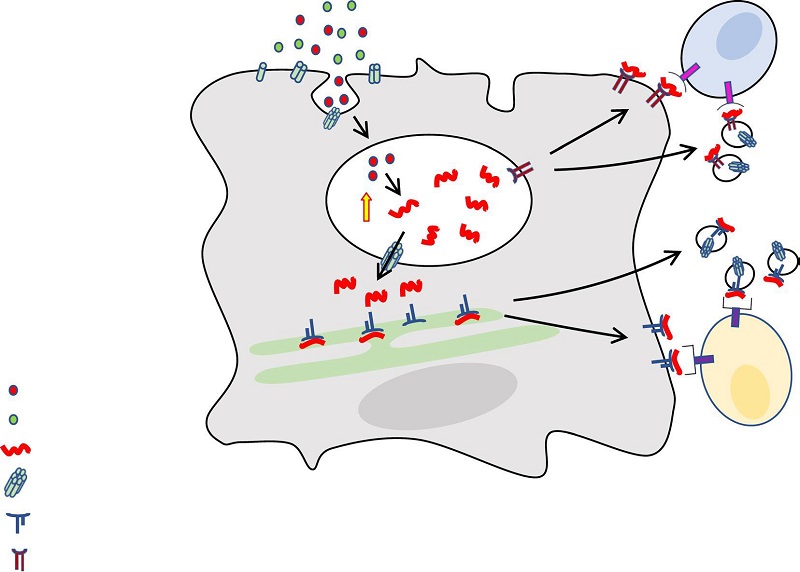The immune system plays vital roles in protecting host against a wide variety of pathogenic organisms and malignant cells. Acquired immunity is a specific immune protection system with immunological memory to recognize specific antigen. Antigen presentation is the first step of acquired immunity which mediated by professional antigen-presenting cells for antigen uptake, processing and presenting to prime and activate T cells. However, the cellular and molecular mechanism of antigen presentation is incompletely understood and hinders the development of clinical drugs and vaccines in some way. Different from classic membrane proteins (including membrane receptors, ion channels and transporters, etc.), pore-forming proteins (PFPs) are existed in water-soluble monomer form; once they reach their target cell membrane, they will oligomerize and insert in membrane systems to form transmembrane channels.
In previous studies, ZHANG Yun’s group from the Kunming Institute of Zoology of the Chinese Academy of Sciences identified a vertebrate-secreted PFP and trefoil factor complex (CAT) from the frog Bombina maxima (Invention Patent ZL200810058028.5; PLoS One, 2008). This protein machine works through a novel molecular pathway including its extracellular assembly regulation (J Biol Chem. 2020), double-receptor binding model to initiate the endocytosis (Commun Biol. 2019), the formation of material channel on endolysosome, and the promotion of the release of exosome. They found that CAT plays important roles in facilitating material trafficking, maintaining mucosal barrier repair, and mediating host innate immune defense(Proc Natl Acad Sci USA 2014, cover story; J Infect Dis 2017; FASEB J. 2019). Thus, an innovative concept of secretory cell endolysosome channel was formed.
Recently, the researchers have further revealed that the action pathway of secretory cell endolysosome channel is consistent with the cellular mechanism required for antigen presentation. In this study, they found that CAT may upregulate antigen uptake through pinocytosis, neutralize endocytic organelles acidifications, facilitate the formation of cellular endolysosome mediating delivery of internalized antigen peptides to the cytosol, and stimulate functional exosome release. These effects largely enhanced antigen presentation capacity of antigen-presenting cells, especially in MHC-I mediated antigen cross-presentation, leading to robust activation of both humoral and cellular immune responses.
This study further confirmed the function and significance of secretory cell endolysosome channel as well as provided new ideas and clues for studying the molecular strategies and mechanisms of antigen presentation in acquired immunity, and also provided a novel potential adjuvant for vaccine development.
This study, titled A secreted pore‐forming protein modulates cellular endolysosomes to augment antigen presentation, was published online in FASEB Journal on August 12, 2020. Website link: http://dx.doi.org/10.1096/fj.202001176R.
The first co-authors of this paper are DENG Chengjie and LIU Long, ZHANG Yun from KIZ and LI Shengan from Kunming Medical University are co-corresponding authors. This research was financially supported by grants from the National Natural Science Foundation of China, the Yunling Scholar Program, and the Yunnan Top-notch Young Talents Program.

(Imaged by ZHANG Yun)
(By DENG Chengjie, Editor: YANG Yingrun)
Contact:
YANG Yinrun
yangyingrun@mail.kiz.ac.cn

